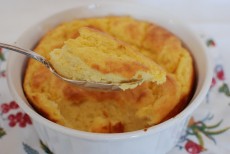My First Book of Southern Cookery: Spoonbread and Strawberry Wine
Good food inspires good thoughts.
Mamie Jean Sampson Darden
 In 1979 in Charlottesville,Virginia, I bought my first book on Southern food and culture, Spoonbread and Strawberry Wine: Recipes and Reminiscences of a Family by Norma Jean and Carole Darden. New to Virginia, I had just become intrigued with the idea of spoonbread, and who could resist strawberry wine?
In 1979 in Charlottesville,Virginia, I bought my first book on Southern food and culture, Spoonbread and Strawberry Wine: Recipes and Reminiscences of a Family by Norma Jean and Carole Darden. New to Virginia, I had just become intrigued with the idea of spoonbread, and who could resist strawberry wine?
Spoonbread and Strawberry Wine turned out to be much, much more than a cookbook. Along with family recipes were first-hand accounts of travel, romance, and adventure, all held together by bonds of family and place. Thirty-five years later, I have yet to read a cookbook memoir as gratifying.
From the picture of the smiling apron clad Darden sisters on the cover to the teachers, doctors, lawyers and ministers in its pages, Spoonbread and Strawberry Wine contradicted the media’s images of the black community. Instead of dysfunctional fatherless families living on welfare in drug and roach infested ghettoes, we saw hard-working generations of folks working together to preserve and celebrate their connections to their past and to one another.

In the book’s pages, I recognized what I had always known but had seldom seen acknowledged—black people from the South were not that much different from their white neighbors. They ate the same foods and they showed the same intense attachment to family and place. This was made clear in the discussion of occasions such as funerals:
Some of the best Southern cooking is to be had during these times of sorrow…Friends and neighbors play an important role, each preparing and donating food to those who are grieving, so that they need not have the burden of cooking for themselves or the many guests who will be visiting the home…Tables are arranged and the food tastefully displayed for the dinner following the funeral, when friend and family will come together to mourn, to comfort, and to share their feelings with one another. It is a simple act of thoughtfulness to the living, but it takes the form of a feast.
One difference did distinguish the Dardens from hard working white southern families; every step of the way the Dardens had to struggle against a wall of prejudice and discrimination that was seen by far too many Southerners as “tradition.” However, the book never preaches. It allows the family’s experiences to speak for themselves. These stories, woven matter-of-factly through the book, give a first-hand account of what it meant for these Americans to pull themselves up by their bootstraps, as in this account of their Uncle John:
…a stranger seeking refuge from a lynching mob had run into his office quite out of the blue. With no questions asked, Uncle John left and returned in a flash with a few fearless and daring black citizens and the white Republican postmaster (a federal appointee in those days, when Republicans were considered liberals). The mob had gathered momentum and was threatening to storm the building. The postmaster kept the mob distracted while John and his friends spirited the man out of town. The man’s crime? A visitor from Chicago unfamiliar with local customs, he had almost lost his life for taking a seat in an empty white restaurant while waiting for directions to another town.
When asked if he ever thought of leaving the South, Uncle John Darden had replied that in the darkest days in the backwoods of Alabama, he had never wavered in his determination to remain in the community he loved.
The recipes in Spoonbread and  Strawberry Wine are as rich and diverse as this American family. Elegant offerings such as “shrimp stuffed filet of flounder,” are included alongside southern favorites such as Smithfield ham and blackberry cobbler. Mom Sampson’s spoonbread can’t be beat.
Strawberry Wine are as rich and diverse as this American family. Elegant offerings such as “shrimp stuffed filet of flounder,” are included alongside southern favorites such as Smithfield ham and blackberry cobbler. Mom Sampson’s spoonbread can’t be beat.
The Darden tradition continues in New York City with a catering and restaurant business.














